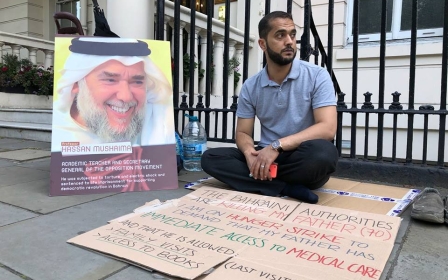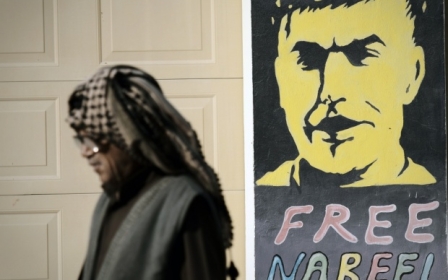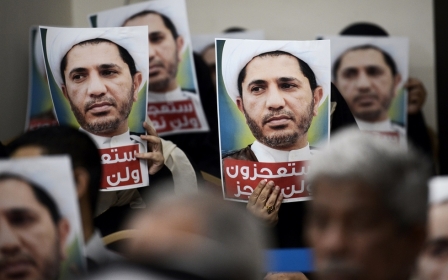Bahraini activist is in hospital after month-long hunger strike

The son of a Bahraini activist was taken to hospital on Thursday from outside Bahrain's embassy in London, where he had been camped for nearly a month in protest at his father's prison conditions.
Ali Mushaima, 35, was on a hunger strike, which he began after his imprisoned 70-year-old father Hassan Mushaima was denied proper medical care for his cancer.
His son has vowed to continue his protest until the rights of his father, who is serving a life sentence in a Bahraini prison for leading anti-government protests in 2011, are restored.
On Thursday afternoon, his 30th day outside the embassy, Mushaima was taken to St Thomas’s Hospital in London's Westminster by ambulance, following fears for his health.
"He was just lying on his bed lifeless all day yesterday"
- Sam Walton, Anti-War activist
Activists supporting Mushaima said doctors who were called to the Bahraini embassy on Wednesday evening referred to his condition as "critical".
Hunger Striker @AMushaima is in critical condition according to his doctor. He is completing one month of his hunger strike to demand humane treatment for his 70 yr old imprisoned father in #Bahrain pic.twitter.com/85yhY0oonj
— Sayed Ahmed AlWadaei (@SAlwadaei) August 29, 2018
“Ali’s blood sugar dropped significantly, along with his sugar levels, while his heartbeat increased quite rapidly,” Sam Walton, an anti-war activist who has been supporting Mushaima, told Middle East Eye.
“He was just lying on his bed lifeless all day yesterday. We got worried about him and called a doctor to assess Ali’s condition. It was only after examining him when the doctor said he was concerned for Ali’s health.”
Activists told MEE that Ali, who has only had liquids during his protest, had lost approximately 13kg since beginning his hunger strike.
Medicine, shackles and humiliation
Ali began his protest after the Bahraini authorities denied his father medical treatment because Hassan, who was diagnosed with cancer several years ago, refused to wear shackles while being treated.
The Bahrani embassy in London told MEE earlier this month that it was not denying medical care, but that Hassan Mushaima had refused to wear a prison uniform to attend the appointments.
“Unlike many other jurisdictions, inmates in Bahrain wear their own clothes, not uniforms, while in prison. However, when inmates leave the prison facility, whether to attend a trial or go to hospital or visitation, they are required to wear a uniform.”
In response, Ali Mushaima told MEE that his father was forced to walk in chains and shackles to receive treatment.
“Rather than giving him his medication inside his cell, the Bahrainis are making him walk to a counter for his medicine in this uniform," Mushaima said. “He is an old man, and they are trying to use any excuse to humiliate him and break him down."
“They are killing my father slowly. He is 70 years old and by denying medicine and books they are trying to break him down bit by bit,” he said.
“This was not an easy decision to make. I left my wife and daughter to be out here. But if this is the only way to save my father, then so be it.”
Over the course of Ali's protest, Bahrain has agreed to allow his father to go to the hospital unshackled for a cancer PET scan, activists said.
On Wednesday, a day before his condition deteriorated, Ali Mushaima said Bahraini authorities were “shameless” and that he would continue his hunger strike until his demands are met.
"It took a month of hunger strike in London before they allowed my father to undertake his cancer screening in Bahrain,” Ali Mushaima said, according to a Bahrain Institute for Rights and Democracy (BIRD) press release.
“The same happened with my other requests, which they ultimately acknowledged. I will not stop until my father gets what he is entitled to, and the more authorities abuse him, the more I will expose them.”
Before coming to the UK, Ali was a bus driver and activist in Bahrain.
He had his Bahraini nationality revoked after being sentenced to 45 years in prison, and came to Britain as a political refugee in 2006, where he has remained active in campaigning for rights in his country ever since.
Middle East Eye propose une couverture et une analyse indépendantes et incomparables du Moyen-Orient, de l’Afrique du Nord et d’autres régions du monde. Pour en savoir plus sur la reprise de ce contenu et les frais qui s’appliquent, veuillez remplir ce formulaire [en anglais]. Pour en savoir plus sur MEE, cliquez ici [en anglais].




